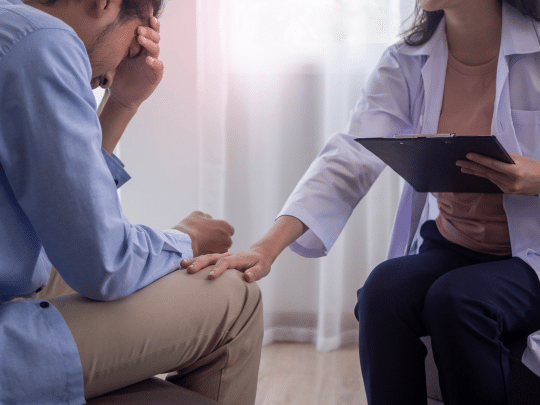Introduction
What is depression? Depression is a health problem that disturbs not only the mind but also the emotions. Depression causes long-term sadness, loss of interest in things, and trouble doing everyday tasks. It disturbs millions of people’s lives around the world and is one of the main causes of disability. The World Health Organization says more than 280 million people have depression. It is further than just feeling sad; it can touch every part of life. In this depression guide, I will clarify the causes of depression, treatments, techniques to cope, faith-based views, and legal or disability rights. Whether you have depression, are helping somebody with it, or need to identify more, this guide shares clear and helpful info. 
Causes & Triggers of Depression
Purpose of this section
This part clarifies the main reasons why depression can occur. We look at three key areas: body (biology), mind (psychology), and life situations. After knowing these causes, people can notice timely signs and get help quicker.
Is depression neurodivergence?
Neurodivergence means the brain works differently from what’s typical, like in autism or dyslexia. Depression is not considered neurodivergent. The people who suffer from neurodivergence are more likely to have depression. This can be due to anxiety or trouble in social situations. All of these challenges can make life full of hurdles. Learn more about the overlap between depression and neurodivergence in our article on Is Depression Neurodivergent?
Have I fallen out of love, or am I depressed?
Falling out of love typically means feeling detached from your partner, losing romantic feelings, or feeling exhausted from the relationship, but on the other side, you might still enjoy other parts of life. Depression, however, takes a constant low mood that disturbs your energy, trouble concentrating, variations in eating or sleeping, and no interest in activities, even those unconnected to your relationship. For more insights, check out our blog on Have I Fallen Out of Love, or Am I Depressed?
Can depression cause…
Tinnitus? Indirectly. Anxiety and stress associated with depression can create a ringing in the ears more clearly. Seizures? Not often. Depression doesn’t directly cause seizures, but it may coexist with a neurological condition. Dizziness? Yes. This can be due to tiredness, medication side effects, and hormonal imbalance. Anemia? No. Depression doesn’t cause anemia, but living with chronic illness can worsen depressive symptoms. Schizophrenia? No. They are separate disorders but may share some brain chemistry patterns and rarely occur together. Cancer? No verified link. But chronic stress and depression can affect immune and hormonal systems—exploration is continuing. Iron deficiency? No direct cause, but iron-deficiency anemia can increase fatigue and low mood. Dementia? Untreated depression in older adults can mimic dementia symptoms (“pseudodementia”) and may increase the danger of later cognitive decline.
If you want to learn more about how depression causes tinnitus, dizziness, and other physical symptoms, read our detailed guide here.
FAQs
Q1: Can stress cause major depression?
Yes. Long-term tension can upset brain chemicals and possibly depression.
Q2: Can depression turn into schizophrenia?
No. They are diverse illnesses; people can have more than one at a time.

Treatments & Therapies
This part clarifies the different treatments for depression—old and new. I will discuss medications, therapy, healthy habits, and newer medical treatments. The purpose is to demonstrate how each works, what you might feel, and any side effects. Modern & Traditional Treatments Depression treatment is different for everybody. Common selections include:
- Some medicines like antidepressants help to maintain the brain chemicals.
- Therapies like speaking with counselors to change thinking patterns and recover mood.
Change lifestyle like consistent exercise, better sleep, and eating healthy. For severe depression, doctors may use innovative treatments such as:
- electroconvulsive therapy
- transcranial magnetic stimulation
What Happens After Ketamine Treatment for Depression
Ketamine can help people recover their mood speedily sometimes in only a few hours or days particularly for people who don’t feel better with consistent antidepressants. People frequently say they feel lighter, purer in their minds, or less heavy. These good feelings may not always last, especially after getting treatment. Some people feel a bit detached, dizzy, have unclear vision, or experience a temporary rise in their blood pressure. Doctors watch these effects thoroughly.
How Long Ketamine’s Effects Last
It’s different for each person. Some people feel better for a few days, while others stay better for weeks. To keep the effect going, follow-up treatments—like more ketamine infusions or nasal spray sessions. Ketamine is typically used as a short term treatment.
Adderall and Depression
Can Adderall help with depression? Adderall is a medicine for ADHD. It can provide more energy, concentration, and inspiration for people with ADHD who also feel low or tired. But it’s not the main treatment for depression. Can it cause depression? Yes. If abused, stopped unexpectedly, or throughout the “comedown,” it can cause irritability, worry, and low mood. Does it cause depression in everyone? No, but in some people—particularly if they take too much or stop abruptly—it can. Each time, it is used under a doctor’s care.
Mounjaro and Mood
Mounjaro is used for type 2 diabetes and weight loss. There’s no evidence it openly causes depression. However, any medicine can indirectly disturb mood due to side effects, variations in weight/appetite, or adjusting to health changes. Tell your doctor if you notice mood alterations.
FAQs
Q1: Is ketamine safe for depression?
if a doctor prescribes it then it may be safe. Side effects can include feeling “out of it,” higher blood pressure, and infrequent bladder complications. We don’t totally recognize the long-term effects till now.
Q2: Can I take Adderall if I’m depressed?
Only if your doctor provided it to you for ADHD. It’s not a usual depression treatment and can create mood worse if misused.
Q3: Can my diabetes medicine change my mood?
Maybe. Some medicines, like Mounjaro, are still being considered for mood changes. Tell your doctor if your feelings change. 
Daily Life with Depression
Depression can make daily things feel very tough. This part shares easy, practical instructions to help you get going, take care of yourself, and stay interested—even on low-energy days.
How to focus on studying when depressed
When you’re depressed, it’s hard to motivate. Try breaking study time into short pieces—like 25 minutes working, then 5 minutes resting (Pomodoro method). Make minor, clear objectives like “read chapter 2” instead of “study.” Set a routine, take consistent breaks, and select a calm study spot—quiet room, natural light, or soft music. If you get stuck, have a conversation with a friend, coach, or counselor so you don’t feel alone. For more tips, see our full guide on how to concentrate on studying when depressed
How to get out of a depressive “funk”
A funk can feel stuck in heavy mud. Start from small things like changing outfits, opening a window, or making your bed. Write one good thing about you every day, even if it’s a little one. Use “sensory resets” like a warm shower, fresh air, or a preferred song to enhance your mood. Tell somebody, “I’m not feeling great today,” so you don’t carry it alone.
How to stop feeling ‘lazy’ when you’re depressed
Feeling “lazy” is frequently just being tired, equally in your body and your feelings. Don’t try to do it all at once. Do the smallest thing you can, like washing one dish instead of all of them. Celebrate these minor wins—they matter. Ask for kind help from others, like a friend to study with, somebody to share chores with, or a check-in buddy.
How to get motivated
When Depressed, connect the task to feeling well. Tell yourself, “This food will provide me more energy,” or “A little walk will clear my head.” Cleaning: Choose one tiny spot, like a desk or counter. Try to clean when your mood is a bit better, frequently in the morning. Exercise: Start super small—a stretch in bed, a two-minute walk, or light yoga. Track what you do and be pleased with sticking with it. Trying it with a friend can make it easier. Losing Weight: Don’t punish yourself for heavy weight. Focus only on eating healthy, drinking water, and moving in methods you enjoy. Little changes, like selecting water instead of soda, can add up over time.
For more tips on building momentum and energy during tough days, read our guide on how to get motivation when depressed?
FAQs
Q1: I can’t study because depression also makes me tired. What should I do?
Try little study times like 5–10 minutes (Pomodoro method). Start with the smallest goal, even just reading one line.
Q2: I feel lazy and don’t want to try. How can I start?
Think of it as “exhausted,” not “lazy.” Do the easiest thing first—brush your teeth, open a window, or only stand up.
Q3: I want to exercise, but my body hurts, and I feel empty. What can I do?
Start with very minor, kind moves. Count each small action as progress, not as a task. 
Depression and faith
Look at how different faith views recognize depression, and how they provide comfort, hope, or techniques to cope.
What does the Bible says about depression
The Bible doesn’t use the word “depression,” but it talks a lot about sorrow, and feeling. A lot of Psalms are true about deep pain—like Psalm 42, which says, “Why are you cast down, O my soul?” This displays that even people with strong faith can feel low. For a deeper study, check out our detailed guide on What Does the Bible Say About Depression?
The Bible frequently tells us that God is nearby, always provides peace, and helps in tough times. Verses like Philippians 4:6-7 (about anxiety), Isaiah 41:10 (about fear and loneliness), and John 16:33 (about trouble and hope) offer ease. The story of Elijah in 1 Kings 19 displays that even prophets could have faced tiredness and despair.
Catholic view on depression
The Catholic Church teaches that depression is not an evil or weakness.It is a type of suffering that wants kindness and care. It encourages prayer, church sacraments, and getting professional assistance or speaking to a pastor. Some saints, like St. John of the Cross, wrote about the “dark night of the soul,” meaning times when God feels far away can still be part of growing in faith.
Satanic Bible’s view on depression
The Satanic Bible shows that you are in control of your own life. It says to know yourself, set restrictions with others, and take steps to become stronger. It doesn’t ask for support from God but encourages you to face complications directly and shape your personal life.
Is depression a sin?
Most Christian groups say depression is not a sin. It’s an actual emotional, physical, and spiritual struggle. The Bible displays that sadness is part of life, not a symbol of weak faith. For a detailed guide on “Is depression a sin” or anything else. Read our blog
What does God say about depression and anxiety?
The Bible says God cares for you: “Give your concerns to God as He cares” (1 Peter 5:7) “God is nearby to those who are sad” (Psalm 34:18) “Sadness may last for a night, but joy will come” (Psalm 30:5)
How to overcome depression biblically?
- Pray fairly, even if it’s just, “God, I feel hollow.”
- Read Bible verses of hope each day.
- Stay near your church or faith group.
- Talk to a pastor or Christian counselor.
- Thank God for minor good things each day.
FAQs
Q1: Can people with depression still have strong faith?
Yes. A lot of people in the Bible felt very sad but still relied on God deeply.
Q2: Is feeling depressed a sin?
No. Depression is a tough feeling, not a sin.
Q3: How can I pray when I feel nothing inside?
You can just talk: “God, I’m here.” You can also read the Bible, listen to worship songs, or sit silently with God.

Disability & Legal Aspects
It is tough to live with depression. Knowing your rights and legal protections can help you get the support you want.
Can You Get SSI for Depression?
Yes. In the U.S., the Social Security Administration (SSA) may provide you with Supplemental Security Income (SSI) if your depression makes it very hard to work or do regular tasks. You must display medical evidence, previous treatments, and the fact that your symptoms continue even with care.
Is Depression a Disability?
Yes, it can be. Under the Americans with Disabilities Act (ADA), depression counts as a disability that disturbs one’s main life activities like concentrating, talking, or keeping a job. Major Depressive Disorder is also listed in the SSA’s official list of medical conditions.
Do Depression and Anxiety Qualify for Disability?
Yes. You can get disability help for depression, anxiety, or equally if your symptoms—like panic attacks, feeling very exhausted, or having trouble concentrating make it hard to work. For depression disability, you want good medical evidence to display how it stops you from working.
Are Anxiety and Depression Considered a Disability?
Yes, they can be under U.S. law if they are severe and continuing. Short-term complications typically don’t count.
How to Get Short-Term Disability for Anxiety and Depression
Short-term disability typically comes from your job or private insurance. To get approved:
- Take medical records from an approved mental health professional.
- Show evidence that your symptoms stop you from doing your work.
- Stick to your treatment plan.
These benefits usually last from a limited weeks to about six months.
VA Disability Ratings for Depression and Anxiety
If your depression or anxiety is caused by your military service, you may get monthly disability payments from the VA. Pay Rates (2025): A little hundred to numerous thousand dollars a month, depending on your rating and family situation. Common Ratings: 0%, 10%, 30%, 50%, 70%, or 100%, centered on how severe your condition is and how it disturbs your life. Migraines: If service-related, can get a separate rating from 0% to 50%. Other Conditions: VA also rates PTSD, migraines, and many physical complications. Ratings can be added together, but VA uses a distinct “combined ratings” system to calculate the ultimate number.
FAQs
Q1: What are the early signs of depression I shouldn’t ignore?
Persistent sadness, loss of interest, variations in sleep/appetite, poor concentration, tiredness, feelings of worthlessness—particularly if lasting >2 weeks and affecting everyday life.
Q2: Is depression inherited? Genetic factors increase threat—but environment, life happenings, and brain chemistry also play key roles.
Q3: Can faith alone heal depression?
Faith can offer ease, meaning, and resilience, but clinical treatment (therapy or medication) is frequently crucial for several sufferers. Integrative methods work best.
Q4: How long does it take to recover from depression?
Recovery may be differing; slight cases may improve in weeks with treatment; moderate to severe cases might take months to years. Continuing support can help reverse the effects.
Q5: Can exercise replace medication for depression?
Exercise is great and recommended—even everyday walks help—but for moderate to severe depression, exercise only may not suffice. Combining a workout with therapy or medication yields better effects. 
Conclusion
This guide easily clarifies depression—what it is, why it happens, techniques to treat it (from medicines like ketamine to new therapies), instructions for everyday coping, faith-based guidance, and your rights if you want disability help. It’s here to guide you whether you need to know your symptoms, choose a treatment, grow your faith, or get the profits you deserve. Depression is not your mistake, and with the correct help, you can feel well. If you’re struggling, consider talking to a therapist, joining a support group, reaching out to a faith leader, or speaking with a legal advisor. You are not alone. Take your next step—talk to an expert or read our useful content, to learn more about your choices.


Recent Comments